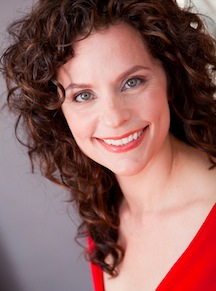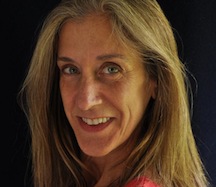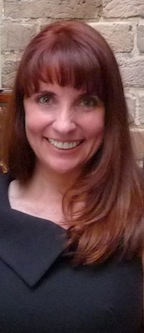The Tennessee Williams New Orleans Literary Festival's 26th year this March brought fan favorites from classic Williams plays to the annual Stanley and Stella Shouting Contest. It also brought panels discussing a literary world balancing the rise of the e-book with an ever-increasing field of publishing options for writers. I had the opportunity to pick the brains of ICM super-agent Lisa Bankoff; her client Jessica Maria Tuccelli, author of Glow; and Patricia Boyett whose manuscript The Right to Revolt won Pitchapalooza.

JESSICA MARIA TUCCELLI
Author
Glow digs deeply into the background of the pre and post-Civil War South. How did you sort through the folklore of the Georgia region that you spent three summers traveling through?
Jessica: I felt intoxicated by the many tales I heard and read, several of which would find their way into the novel. In Glow, the environment is infused with ghosts, and accordingly, I focused on haint stories and Cherokee myths of creation. As I strove to invent a world in which a ghostly encounter would be a commonplace experience of the senses, the intellect, and the subconscious, I relied on my intuition to guide me to the right stories. For example, when I came upon the Cherokee myth of the "Little People," who are not so nice folks who live under the water and can lure you to your death, it became the underpinning for a character's ability for visions or her mental decay, depending on your interpretation
Fresh off the first book tour of your first book (congratulations!) -- what were some highlights of meeting your readers around the country?
Jessica: Thank you! There are so many, but one pops to mind right away: I had a marvelous experience in Rabun County, Ga., where I had spent two summers immersed in the collections of the local historical societies and getting lost on the red clay roads. One of the first stops on my book tour was in Clayton, the county seat of Rabun County, at the Beechwood Inn, where I had been invited to present Glow. I was nervous -- in Glow, the fictional county of Hopewell is based upon the lore, landscape, and histories, both public and private, of Rabun County, and I didn't know how the community would receive it. The people of Southern Appalachia have been maligned in film and literature, and I had no intention of contributing to that canon. With Glow, I hoped to honor the diverse cultures -- black, Cherokee, Scotch-Irish -- of the region.
The event was held on the front porch of the Beechwood Inn, which has a breathtaking view of the surrounding mountains. The air was unseasonably warm (this was March) and bursting with the scent of spring. The innkeepers, David and Gayle Darugh, served wine and hors d'oeuvres, and the porch filled with local people, who welcomed me enthusiastically. They were kind and generous with compliments for Glow, and genuinely intrigued by this Yankee who took so much interest in them. Afterwards, two guests confided in me that my novel was already being quoted. "What do you mean," I asked. "Well, Jewell here was hammering a nail and hit her finger. 'Sometimes pain is just pain,' she said," which is something one of my characters says in Glow. My writing experience had come full circle. I am most grateful to the people of Rabun County who midwifed Glow into being.
When you first heard back from Lisa Bankoff, the winning-the-lottery-of-agents agent, how long had you been pitching your manuscript?
Jessica: The overall process took about six months. I am a nerd at heart, and so I approached finding my dream agent methodically and assiduously -- whom did they represent and did I enjoy their clients' work, would I "fit in on their shelf," how did they wish to receive a query or manuscript submission, and so on. It was a matter of tenacity and patience. When Lisa emailed me saying she would like to set up a meeting, I think people could hear me whooping in the four other boroughs of NYC. Probably New Jersey and Connecticut, too! When we finally met, I knew I had found the right agent for Glow; we had the connection I was seeking.
I think I heard that shout in Louisiana. With a degree in anthropology and a background in acting, you bring a unique combination to the table. How do the two fields help the characters come to life?
Jessica: To quote Margaret Mead, "Anthropology demands the open-mindedness with which one must look and listen, record in astonishment and wonder that which one would not have been able to guess." The skills I acquired in my training at MIT and in the field allowed me to draw from my personal experience with the local people and transform that into the historical foundation and background for my characters. Acting allowed me to inhabit my characters. Perhaps it is an unconventional approach to writing, but it is vital to my method of creating for the page as well as the stage. Experience and imagination are like the reactants in a chemical equation, the writing is the product.
The relationships between Amelia J. McGee and Lovelady Belle Young stayed with me long after finishing the book. Are they still floating through your consciousness on occasion?
Jessica: They did for some time after I finished the manuscript. I know this to be true because shortly after I began sending Glow out, it was difficult for me to settle into the new characters that I had created for my next novel, as if I could not shake off Amelia and Lovelady; they were still part of me. But happily, I can report that since publication, they belong to the world and no longer haunt me.
If it's not too soon to ask after the brand new novel, what are you working on now? Even if it's just an inkling.
Jessica: Happy to share! I'm working on another novel, prompted by a re-reading of Toni Morrison's The Bluest Eye. Her use of the omniscient and central narrator is seamless and inspirational. I'm drawn to work that breaks convention. As for the story, I'm willing to share the inciting event, the spark for the narrative, which was a bat, a dead bat to be more precise, that I stumbled over in the Boston Common. I'm also working on a screenplay set in Rome about a music teacher -- an American who survived the Battle of the Bulge, freed the Jews at Bergen-Belsen, studied cello under Pablo Casals -- and his student, a young Italian girl. It's good to be back at my desk writing again.
*****

LISA BANKOFF
Agent
Publishing is in flux, but the basics of good books finding their way to readers are still the same. What are a few elements that draw you to a client during their initial pitch letter process?
Lisa: A great pitch letter levitates from the stack. It feels almost magical but it's practical magic based on pragmatic ingredients: clarity of expression and a clear-eyed, hype-free description of the proposed book.
You represent bestseller Ann Patchett, a force of nature not only in writing but in opening her own book shop. How crucial are independent book shops in the publishing world?
Lisa: Like so many people, I enjoy wine but am daunted by the abundance of grape varieties. Their fine distinctions elude me. Given choice between wandering the aisles of a discount warehouse until all those bottles blur or seeking out a smaller shop where the owner makes time to understand my taste and suggest a surprising new red or white, it's a no-brainer. Ditto the independent bookstore where staff works hard to please as well as challenge the palate.
Shopping an independent is money well-spent and you won't end up pouring half of your purchase down the drain.
Good analogy, except that now I want wine and advice about wine. With e-books, book trailers, independent presses and social media changing the literary landscape, do you think there's still a place for a traditional author book tour?
Lisa: Long before e-books and social media, for many writers the traditional tour was already taking a beating. That said, there's always upside in making a human connection. The sensible thing is to evaluate on a book-by-book basis whether it's smart and cost-effective to concentrate appearances locally, expand regionally, or take the author coast-to-coast.
I enjoyed the panel with you and author Jessica Maria Tuccelli at the Tennessee Williams Literary Festival. What was it about her manuscript that made you want to represent her work?
Lisa: Thank you. Everything about Glow appealed to me. Language, character, time, place -- it's a completely immersive reading experience.
Haunting is the word that comes to mind, in the good way. There was no Pulitzer Prize for fiction this year, with the panel split between more than one book. What can you tell readers to dispel the perception that fiction didn't measure up?
Lisa: Measure up to what? Readers should decide for themselves and read all the finalists. We should have a People's Pulitzer and see how the votes add up. Hmmm. Would that be any less meaningful?
It would be very interesting and probably a hit reality show. Last Question: Two parts! Who are you reading right now? And whose book is up next?
Lisa: Speaking of Pulitzer winners, I'm reading Tinkers by Paul Harding. I don't know what's next but likely it's an unpublished manuscript.
*****
PATRICIA BOYETT
Aspiring Author
The festival's Pitchapalooza was a nail biter -- I remember they were about to cut off the pitches for time and squeezed you in at the last minute. What did it feel like when you found out the panel was letting in one last author for a pitch?
Patricia: Like many people in the room, I have spent endless hours trying to distill my manuscript down to a paragraph in a query letter. The night before, I stayed up nearly all night practicing my pitch with my gracious husband as my audience until I got it down to one minute. So I was disappointed when I realized that I would not have the chance to pitch. Then, they said they would allow one more pitch and called my name. I was thrilled. I think the combination of emotions helped me because I was able to project that passion into my pitch.
Your book took 10 years of research. Tell us a little more about what you cover in such a historically relevant manuscript in the face of national and international uprisings -- the Right to Revolt.
Patricia: Right to Revolt explores some of the most pivotal racial cases in the South's history. For example, chapter one examines a lynching at the onset of World War II that forced federal intervention in Mississippi for the first time since Reconstruction. Chapter two analyzes a global crusade that emerged during the early Cold War era to prevent the execution of a local black man who had been convicted of raping a white woman.
Throughout several chapters examining the rise of the Civil Rights Movement, Right to Revolt traces the 1950s/1960s federal voter discrimination case against registrar, Theron Lynd, which laid the groundwork for the Voting Rights Act of 1965. Chapter nine examines the state and federal trials of nearly a dozen Klansmen accused of murdering civil rights leader, Vernon Dahmer. Finally, the chapters in Part III delve into racial struggles in the post-civil rights era as African Americans fought for political representation, economic equity, retributive justice in Klan cold cases, equal justice in the streets, and the termination of discrimination in the schools, the courts, and city government.
My sources span the gamut and include a 40,000-page un-redacted FBI file, trial transcripts, court dockets and papers, government records, school district records, law enforcement records, papers of the major civil rights organizations, collections on white supremacist organizations, papers of local civil rights activists and community leaders, diaries, letters, newspapers, documentaries, and oral histories.
The timing of your book picks up just after the time period of The Help. It's also around the time of this season's Mad Men. From your academic background, give us a brief description of that era.
Patricia: Part II of Right to Revolt focuses on the Civil Rights Movement in a Mississippi community. The local struggle is set within the context of the tumultuous and exciting 1960s, which was one of the most transformational and fascinating periods in American history. Four black college students established the zeitgeist of the 1960s when they protested racial segregation and oppression by staging a sit-in at a whites-only lunch counter in Greensboro, North Carolina. Soon, the protest spirit rolled across the South as freedom fighters flooded into areas untouched by the national Civil Rights Movement and as locals propelled their town movements into the national arena. The spirit also inspired discontented and oppressed groups all across the nation to launch demonstrations against the American Promised Land that excluded them.
It was a time when America was at war in Vietnam, but it was also at war with itself. The multifarious struggles of the 1960s captivated the nation. Television images flooded into American living rooms of Klansmen beating freedom riders and sit-in protestors; soldiers dying on Hamburger Hill; a POW blinking torture in morse code; Students for a Democratic Society marching against the war on the Pentagon; hippies preaching peace and free love; women finding their voices in liberation marches; Timothy Leary advocating the benefits of LSD; J. Edgar Hoover waging war on the Klan and the Black Panthers; Americans mourning and raging over the assassination of Medgar Evers, Malcolm X, Martin Luther King Jr., President John Kennedy, and then brother, Robert; and Bob Dylan singing "The Times They Are a-Changin'."
The nation was unraveling, but it was also being rebuilt. Ultimately, the various movements initiated the dismantling of racial, gender, and cultural hierarchies; expanded personal freedoms; and broadened the reach and scope of democracy. In terms of the Civil Rights Movement, the racial struggle terminated de jure segregation and black disfranchisement and marginalized the Klan, but the struggle for equal opportunity and racial justice had only just begun.
I'm bookmarking it to read as soon as it's published, and feeling better informed just from your description. It was a thrill to be sitting next to you when you found out you won Pitchapalooza. Do you have any advice for people who have been hoping for years to get their manuscripts into print?
Patricia: I have not yet published my manuscript, but I hope that I am on the path that will lead to its publication. Certainly, I am glad that I attended the Book Doctor's Pitchapalooza.
So far, my advice is to write about what you are passionate about, become as knowledgeable as possible about your topic and the people involved in the story that you tell, be open to critiques, and be grateful for all advice, aid, and opportunities.
And there you have it, three of my new favorite word folk. Tennessee Williams New Orleans Literary Festival Slideshow below. You can follow the festival on Twitter at TWFEstNOLA.


